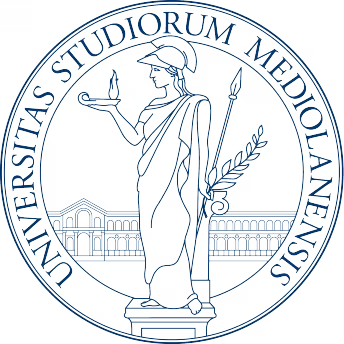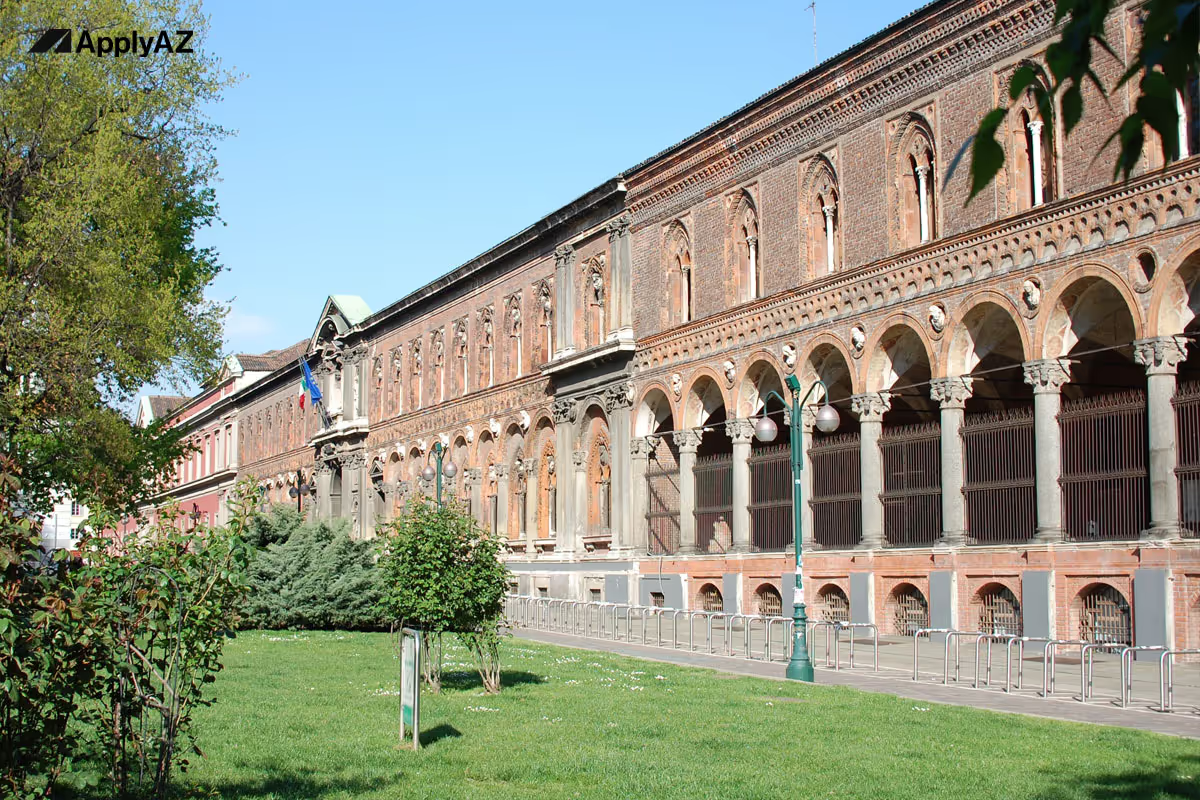Heading
Heading








University of Milan
English‑taught programs in Italy: breadth and quality
Founded in 1924, the University of Milan is a flagship among public Italian universities. It offers more than 15 full degrees entirely in English across life sciences, data science, economics, law, and the humanities. Small‑group seminars, modern laboratories, and research‑led teaching earn the university a consistent place in global top‑200 rankings for medicine, biology, and physics. Academic life blends lectures with project work and Erasmus+ exchanges, giving you both depth and international exposure.
Life in Milan: culture, costs, connections
Milan pairs Renaissance architecture with Europe’s fastest‑growing innovation district. Four metro lines, trams, and regional trains keep average commutes under 35 minutes, while student passes cut transport costs by half. Cafés stay open late for study sessions; world‑class music, design fairs, and football derbies fill weekends. Rents start around €400 per month in shared flats—pricey for Italy, but offset by campus dining at €4 per meal and the chance to share expenses with classmates.
Funding advantages: DSU grant and other support
As a state institution, Milan charges income‑linked tuition that ranges from €156 to roughly €3 000 per year. International students can apply for the DSU grant, which may waive tuition entirely and add a €7 000 living allowance, residence‑hall place, and meal vouchers. Merit scholarships reward top GPAs, and research assistant roles provide paid experience. With these tools, many graduates finish their master’s with little or no debt, mirroring the affordability of tuition‑free universities Italy promotes.
Career gateways in a global city
Milan is home to Italy’s stock exchange and to headquarters of companies such as IBM, Luxottica, and Nestlé. University partnerships cover more than 4 000 firms, feeding internships in finance, biotech, fashion tech, and AI start‑ups. Career Services run résumé labs, mock interviews, and on‑campus job fairs; 87 % of international graduates secure work or PhD places within seven months. Language tandems, alumni mentoring, and professional certification courses (Prince2, CFA Level I, Lean Six Sigma) further boost employability.
Five key takeaways
- Wide portfolio of English degrees backed by strong research.
- Dynamic metropolitan lifestyle with rich art and sport.
- Income‑based fees plus DSU grant make study highly affordable.
- Direct pipelines to internships and high‑growth careers.
- Supportive campus: libraries until midnight, 100+ clubs, free fitness classes.
In two minutes we’ll confirm whether you meet the basic entry rules for tuition‑free, English‑taught degrees in Italy. We’ll then quickly see if we still have space for you this month. If so, you’ll get a personalised offer. Accept it, and our experts hand‑craft a shortlist of majors that fit your grades, goals, and career plans. Upload your documents once; we submit every university and scholarship application, line up multiple admission letters, and guide you through the visa process—backed by our admission‑and‑scholarship guarantee.
Data Science for Economics – LM‑Data
English‑taught programs in Italy attract students who want rigorous study, an international classroom, and affordable tuition. This LM‑Data master’s lets you study in Italy in English while exploring how big data reshapes markets, policy, and business. Offered by the University of Milan (Università degli Studi di Milano), one of the leading public Italian universities, the course combines statistics, coding, and economics. With scholarships for international students in Italy—especially the DSU grant—many learners reduce costs to levels seen in tuition‑free universities Italy supports through state aid.
Why Choose to Study in Italy in English for Data Science?
Studying data science in Italy provides three key benefits:
- Academic depth at low cost. Public Italian universities keep fees modest. With the DSU grant, you may pay little or no tuition.
- Cross‑cultural teamwork. Classmates from Europe, Asia, Africa, and the Americas bring varied datasets and case studies, enriching every project.
- Location at the heart of EU research. Italy hosts thriving fintech hubs and policy institutions eager for graduates who can translate data into economic strategy.
These factors turn a master’s into a springboard for global data‑economics careers.
The Programme at a Glance
Duration: 2 years (120 ECTS)
Language: 100 % English
Focus areas: Statistics, machine learning, econometrics, business analytics, policy modelling
Learning style: Lectures, coding labs, real‑world datasets, and industry projects
You progress from foundations in mathematics and coding to specialised tracks such as financial analytics, labour economics, or public‑sector data. Each semester mixes theory and practice so you master both algorithm design and economic interpretation.
Core Curriculum: From Data to Decision
Semester 1 – Foundations
- Mathematical Methods for Data Science
- Programming in Python and R
- Advanced Microeconomics
- Statistics for Big Data
Semester 2 – Econometric Strength
- Applied Econometrics
- Database Management
- Machine Learning Foundations
- Economic Policy Analysis
Semester 3 – Specialisation and Industry Links
- Time‑Series Forecasting
- Data Visualisation and Storytelling
- Elective Cluster (choose financial technology, development economics, or marketing analytics)
- Internship Seminar (company or public‑sector placement)
Semester 4 – Thesis
You design an independent research project—often in partnership with a firm or institution—using real datasets such as bank transactions, energy usage, or labour records. Past topics include:
- Predicting sovereign risk with news sentiment
- Evaluating COVID‑19 subsidies through firm‑level data
- Mapping green‑bond market dynamics across the EU
Learning Methods: Hands‑On and Industry‑Ready
Coding labs
Each week you write scripts to scrape, clean, and model data. Lecturers guide you through libraries like pandas, scikit‑learn, TensorFlow, and ggplot2.
Case competitions
Teams tackle a business or policy question in 48 hours, then present dashboards and recommendations to expert panels.
Guest lectures
Data scientists from central banks, consulting firms, and fintech start‑ups discuss real use‑cases—credit‑risk scoring, digital‑euro pilots, or carbon‑footprint audits.
Study in Italy in English Community
Regular meet‑ups with students from other English‑taught programs in Italy give you peer feedback, career tips, and networking across faculties.
Key Skills You Will Gain
- Data engineering: manage relational and NoSQL databases, cloud platforms, and APIs.
- Statistical modelling: run regressions, survival analysis, and causal inference.
- Machine‑learning pipelines: build, tune, and deploy classification, clustering, and neural‑network models.
- Economic reasoning: link results to incentives, market structures, and policy trade‑offs.
- Communication: craft clear visualisations, policy briefs, and business decks for non‑technical stakeholders.
These competences position you for roles that require both analytical power and economic insight.
Career Outlook: Where Data Meets Economics
Graduates land roles such as:
- Data analyst in banks or fintechs—optimising credit models and fraud detection.
- Econometrician for government agencies—measuring job programmes, tax reforms, or climate incentives.
- Consultant in global firms—guiding clients on pricing, demand forecasting, and supply‑chain analytics.
- Researcher in international organisations—working with the IMF, World Bank, or OECD to evaluate development projects.
- PhD candidate—pursuing advanced research in data science, econometrics, or machine‑learning economics.
Employers seek professionals who can blend algorithmic skills with economic logic—exactly the strength of LM‑Data.
Funding Your Studies: DSU Grant and Other Options
Italy’s DSU grant offers:
- Tuition waiver or large reduction
- Housing or rent allowance
- Meal vouchers
- Extra funds for books and transport
Eligibility depends on family income. Apply early and provide complete financial documents. Additional scholarships for international students in Italy reward academic merit, regional diversity, and research proposals. Many learners also earn part‑time income through teaching support or data‑entry contracts, permitted under student visas.
Life Beyond the Classroom
- Hackathons hosted with local tech communities challenge you to solve economic problems overnight.
- Language cafés let you pick up Italian basics—useful for daily life, though not required for the degree.
- Career fairs bring in recruiters from European fintechs, consulting giants, and public institutions.
- Culture and travel: weekends may include Alpine hikes or museum visits, enriching your study experience.
Such activities deepen friendships and networks that last well beyond graduation.
Application Steps and Timeline
- Check prerequisites: bachelor’s in economics, statistics, mathematics, computer science, or engineering with solid quantitative coursework.
- Collect documents: CV, transcripts, passport, English certificate (minimum B2), and a motivation letter.
- Apply online: the university portal opens each spring; earlier submissions receive faster feedback.
- Interview (if invited): discuss coding experience, economic interests, and research ideas.
- Apply for DSU grant: typically between June and September—strict deadlines.
- Secure visa: book embassy appointments early, providing acceptance letter and financial proof.
- Plan housing: university dorms or shared flats near campus.
- Register and attend orientation: meet classmates, finalise timetables, and set up student services.
Tips for a Strong Application
- Highlight courses in calculus, linear algebra, and programming.
- Showcase projects—GitHub repos, Kaggle competitions, or policy reports—that prove data passion.
- Explain why public Italian universities’ research aligns with your goals.
- Mention interest in scholarships for international students in Italy and readiness to meet DSU requirements.
Clear, concise writing at B2 level shows you can succeed in English‑medium classes.
Long‑Term Value of an LM‑Data Degree
- Future‑proof skills: demand for data‑savvy economists grows as AI transforms finance, health, and public policy.
- European recognition: a Bologna‑aligned master’s eases mobility across EU jobs and PhD programmes.
- Network effect: classmates join central banks, unicorn start‑ups, and NGOs—opening doors worldwide.
- Ethical lens: courses on data privacy, algorithmic bias, and sustainable finance prepare you to build fair systems.
- Research potential: access to Italian and EU datasets supports publications and conference presentations.
The programme equips you to lead data‑driven change, whether shaping markets or guiding governments.
Ready for this programme?
If you qualify and we still have a spot this month, we’ll reserve your place with ApplyAZ. Our team will tailor a set of best-fit majors—including this course—and handle every form and deadline for you. One upload, many applications, guaranteed offers, DSU grant support, and visa coaching: that’s the ApplyAZ promise. Start now and secure your spot before this month’s intake fills up.

They Began right where you are










